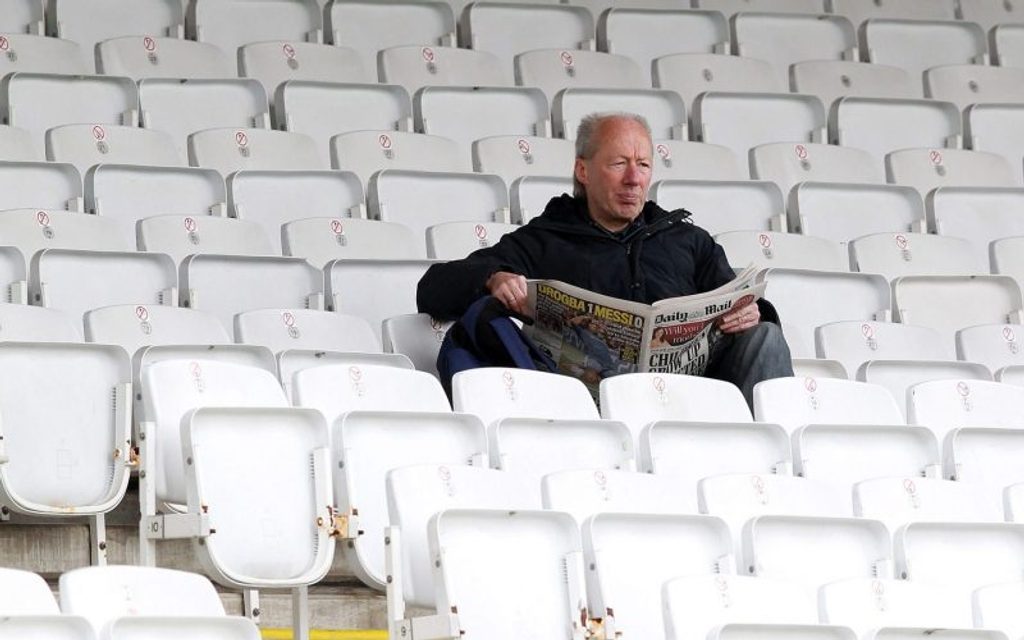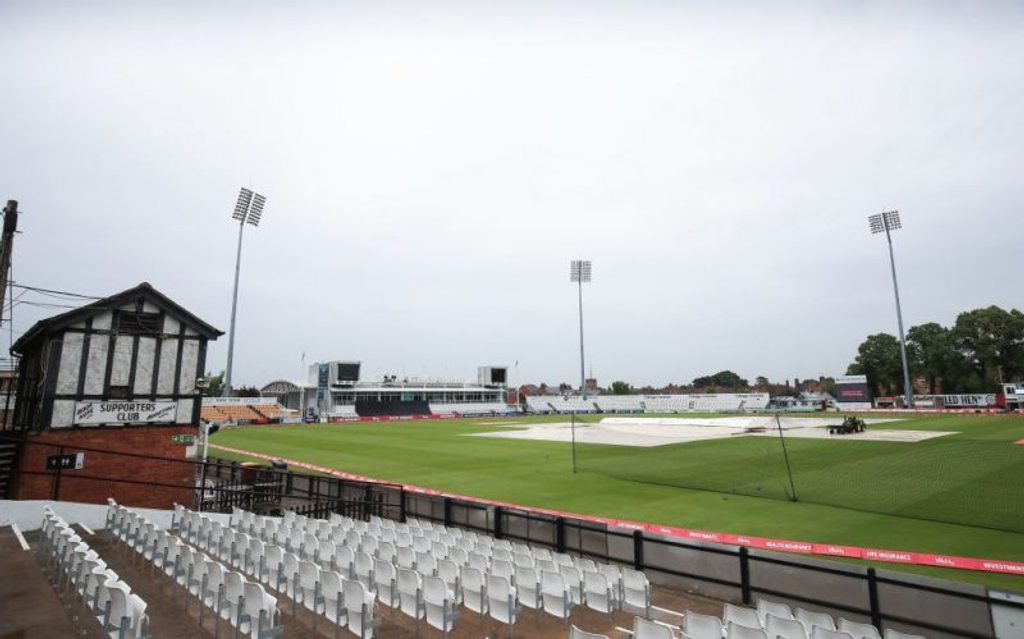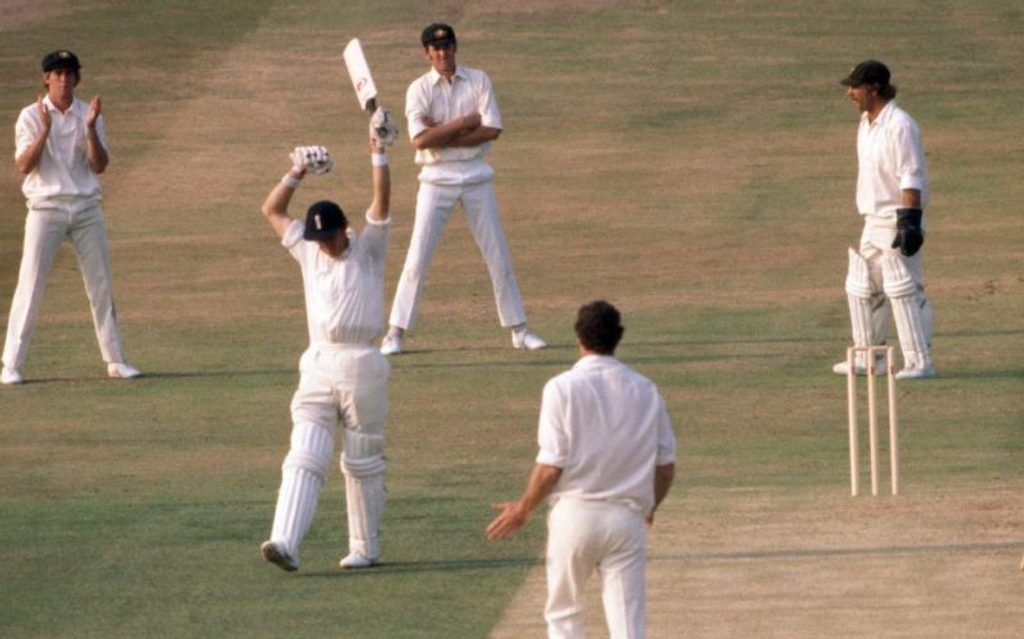
Cricket grounds are as effective as antidepressants, and equal to cathedrals, as places for recuperative meditation – writes Mark Lawson, as he learns how the game can be a cure to adverse mental health from his own personal experiences in the 2020 Wisden Almanack.
Mark Lawson is a journalist, broadcaster, novelist and playwright. He writes about culture for The Guardian, and is theatre critic of The Tablet. He was Wisden’s book reviewer in 1999.
Where is the best place to go after your mother has died? Many must head for the sanctuaries of church, wood, pub or home. On an awkward empty day before mum’s funeral in September, I found myself drawn to Lord’s, where Middlesex were playing Derbyshire in the final round of the Championship. Supposed to be playing: it rained. Not long after her death, another loved one was admitted as a surgical emergency – the third in just over a year – to Northampton General Hospital. One day, between visiting hours, I went to watch Northamptonshire against Durham – or would have done, had the covers not been on, the umbrellas up.
Neither visit saw a ball bowled, but both saw victories: sitting in the stands raised my spirits and restored my equilibrium. This was no surprise. I recently learned that cricket grounds are as effective as antidepressants, and equal to cathedrals, as places for recuperative meditation.
So although I understand the cricketing objections to last season’s unusually late finish, it proved a boon to me. If the family death or hospitalisation had happened on those dates a few seasons earlier, no pilgrimage to Lord’s or Wantage Road would have been possible. And cricket would not have been able to steady my life as, five years previously, the game had, I believe, saved it.
Mum’s local church, where her requiem mass took place, was called Our Lady of Lourdes. Her slightly hybrid vowels – she had lived, successively, in the North-East, London, Leeds and Hertfordshire – meant she pronounced the French shrine “Lords”, creating an overlap between the world’s most revered cricket ground and the shrine where the desperate pray for a miracle (England and Middlesex supporters, insert your own joke here). My mother would have found it mildly blasphemous to refer to being healed at Lord’s, but been pleased it happened.
In the spring of 2014, I very publicly and abruptly left BBC Radio, following editorial disagreements. A fuller account should await the book I may one day publish; the events are relevant here only to establish the perilous position that preceded my recovery. Distorted reporting, encouraged by a morbid obsession with the Corporation in parts of the media, coincided with another crisis: on the day the story broke, the family member who provides so much work for surgeons was undergoing a 14-hour operation.
 Solace in the solitary: a spectator at Lord’s
Solace in the solitary: a spectator at Lord’s
My mental health, fragile for some years, collapsed. One morning, I was unable to get out of bed, or to stop writhing and perspiring. Another symptom was an inability to concentrate, so I shakily scribbled down all 14 physical signs, including insomnia and palpitations. The only symptom I omitted, for fear of being sectioned, was a vivid sensation of having lost a future tense. Presumably from aggregated experience, my excellent GP seemed confident I could get through it, while warning it could take months. To the standard question about self-harm, I responded with a joke about experiencing homicidal thoughts only towards certain BBC executives. In truth, I more expected to die from the effects of the stress and worry than by my own hand. I was signed off on sick leave – for a freelance, a theoretical and terrifying status.
Two months into the illness, I was able to read and write again, but those activities were part of my work. Urged to spend time on something more distracting, I thought of sport, which has been a large part of my life. Most Saturdays and many Tuesdays, from August to May, I go to football matches, but following Northampton Town would be risky for anyone suffering from depressive illness even in the best of seasons, which 2013/14 was not; Northampton were bottom of Division Two, apparently doomed to relegation from the Football League. There were other local clubs, the lesser personal investment reducing the pressure, but any football ground felt too noisy, crowded and relentlessly tense. Nor did the traditional match-day smell of urine and fried onions serve as aromatherapy.
My sense that cricket might be a better balm was not just a hunch. A few years before, when I had two tickets for the Friday of an Ashes Test at Lord’s, the friend I was going with rang to say a relative had died, and the funeral was scheduled for the day of our outing. Just as I was wondering who might go instead, another friend texted to reveal that he, too, had suffered a bereavement, in a sudden and terrible way. My first thought was that it was my moral duty to miss England v Australia, and spend the day with him; my second, not much later, was that the cricket might do him good. Amazingly, thrillingly, it helped him: new to the sport, he found the outing therapeutic and purgative.
If there is a cricket cure, how might it work? Doctors often advise the mentally unwell to get outside, time-honoured belief in the merits of fresh air combining with more recent intelligence about sunshine and Vitamin D. My friend commented on how Lord’s felt surprisingly “rural” (as it would have done when the first match was played there in 1814). He was startled by the smell of grass, and other summer scents.
Mark Twain supposedly described golf as a good walk spoiled; cricket, I think, is a long walk stalled. Grounds are often surrounded by trees, flowers, rivers, while stands are open-topped or open-backed, admitting the breeze in a way rarely found at football stadiums, roofed and walled to keep the crowds apart and the weather at bay.
 Comfort in the ordinary: Northampton’s Wantage Road prepares for a resumption of play
Comfort in the ordinary: Northampton’s Wantage Road prepares for a resumption of play
Equally significant is the rhythm. As detractors are prone to note, no other game, except chess, proceeds so slowly or with such regular breaks: overs, wickets, drinks, meals – and now the Decision Review System. But this pace is soothing for the fragile mind, leaving time for rest and reflection. Watching a game live with radio commentary playing in my ear reminded me of the mindfulness tapes (in which a voice purrs calming thoughts) that were another part of my treatment.
The structure of cricket gives a good lesson for the struggling. Especially in its proper, longer form, the game is built on the idea of a second chance, and the possibility of recovery, even from the worst position. A duck can be followed by a century, a dropped catch redeemed by a flying one-hander. Failure can be extreme and exposing, but there will be a chance to make amends.
The journalistic consensus that it was “redemption” to play two of the greatest-ever innings, a year after standing trial in a case that could have ended his career, has been rejected by Ben Stokes himself. Yet his sport is the most inherently redemptive of all. It has helped to think of the time since my breakdown as a second innings.
The idea of indomitability has helped too. Boxing champions may retire undefeated, and baseball pitchers may strike out, denying the batters a single run. One of cricket’s special pleasures is the match-winning innings no bowler can end. It is fitting that the three most famous modern English turnarounds – Ian Botham’s 149 at Headingley in 1981, Stokes’s 84 in last summer’s World Cup final, soon followed by his 135 at Headingley – all had asterisks. “Not out” is a good motivational slogan for the unwell.
Similarly, while a drawn five-day game may seem boring to those who believe sport should have a winner and a loser, the concept can be inspirational to those who fear their state of mind may prove the final outcome. To shake hands, draw stumps and move on – aware the contest may merely be deferred – is a useful goal for tested minds. And bodies. Watching relatives and friends go through cancer treatment, it has struck me that the draw – in which neither the disease nor the patient decisively wins, but a pause is achieved – is a useful parallel for the new tumour-limiting treatments in modern oncology, which allow even those with final-stage diagnoses to remain in the game, knowing further tests will come. Try telling them that the lack of a decisive outcome is boring.
 Morpheus: Geoffrey Boycott, bringer of sleep, celebrates after getting to his 100th first-class hundred
Morpheus: Geoffrey Boycott, bringer of sleep, celebrates after getting to his 100th first-class hundred
Another key part of the Lord’s cure will be more pleasing to the NHS than the ECB. At my worst, a Test match or one-day international would have been too crowded or loud, hence the county games. The almost complete emptiness of the stands for a Championship fixture – though ominous for the economics of four-day cricket – give even Lord’s the reflective silence of a religious retreat. At a midweek, mid-table game, you can almost literally be alone with your thoughts. Even when it rained at those late-season matches, the effect was not reduced: it simply felt like being in a church when there is no service.
Cricket helps me long after the day’s close. Waking at 3am with the sudden, stubborn insomnia that is a common consequence of anxiety and depression, I try to trick myself to sleep, not by counting sheep, but by replaying in my mind the 100th century of the cricketing hero of my Yorkshire childhood, Geoffrey Boycott, for England against Australia at Headingley on August 11, 1977. It took him 232 balls. On a bad night, I reach the moment, on 80, when he edges Ray Bright, and have another thing to worry about: if DRS had existed, Boycott would surely have been out, and history different. On a good night, I am generally asleep after about two hours, as he nudges the ball off his legs for a single to move into the late twenties just before lunch. And because England’s winter Test series often take place in polarised time zones, radio commentary from Australia or New Zealand has helped me through many wakeful nights.
But if, for listeners and viewers, cricket can be a cure for depression, there is compelling evidence that, for players, it may be the cause. This was first explored in David Frith’s By His Own Hand, a study of cricketing suicides. My edition has, poignantly, a foreword by Peter Roebuck, later described by multiple witnesses in a posthumous biography, Chasing Shadows, as a “troubled soul”, whose fatal fall from a South African hotel, though still disputed, may have made him a candidate for a future edition of Frith’s book.
Candid autobiographies from Marcus Trescothick, Jonathan Trott, Graeme Fowler, Simon Jones and Jonny Bairstow, which reflect on either direct or observed experience of mental pressures, reveal a level of depressive illness in the sport, possibly because cricket is a team game that places individuals in situations of terrifying and pivotal isolation.
Those troublesome case studies made me feel even luckier as my therapy continued. And what brought me back to Lord’s last September had, oddly, a cricketing context. I had arranged to visit my mother on August 26, the last Bank Holiday Monday of the summer. At 2pm the day before, I phoned to sort out lunch plans. There was no answer. I tried again at half-hour intervals, while watching the Headingley Test on television. Each time, the ringing tone continued until I hung up. This meant my Sunday afternoon fluctuated between the ecstatic impossibility of Stokes’s last-wicket stand with Jack Leach, and mounting fear at the likeliest reason for mum’s silence.
Around 6pm, as the triumphantly shattered batsmen struggled to find breath for post-victory interviews, my sister, Geraldine, rang to ask if I’d been in touch with mum, as she had tried all day too. Speaking hands-free, while she drove up ten M1 junctions from London, and I travelled down five from Northamptonshire, we assumed our mother was dead. Paramedics, though, found her unwell but conscious, suspecting either a vascular event or infection.
Next day, while she dozed in hospital, I was reading a newspaper. Waking, she asked: “Is that Stokes?” His face was on every front page. Mum had little interest in cricket, but now made an exception because Stokes was not only connected with County Durham (her birthplace), but looked uncannily like her father. It was he who had introduced me to cricket. Since he was a retired Durham coalminer who had left school at 12, I have always resisted the easy view that it is an upper-class sport. He was staying with us in July 1981, and we watched the Third Test together. As England struggled in the follow-on, my mum, a teacher on school holidays, put her head round the door: “Do you
want a cup of tea, Da?”
“By,” he said – a common Northern prologue to dismay, popularised by the plays of Alan Bennett. “After that batting, I need something stronger.” Mum complied: it was the only time I saw him drink beer before lunch. We then witnessed, through the willpower batting and bowling of Botham and Willis, a cricketing miracle, unmatched until the one achieved by the player with my Granda’s face, a few days before mum died, gently, after a long and remarkable life, her twin children each holding one of her hands.
So it seemed even more fitting to go to Lord’s and, when I was summoned to a second hospital a few days later, to the County Ground. Around half the symptoms listed to my GP five years before had returned, though less severely. That September week, in which I again took the cricket cure, coincided with the retirement of Trescothick. His book, Coming Back To Me, launched a subgenre of cricket literature that makes it impossible now to watch a game without wondering how many of those displaying physical prowess might mentally be struggling.
Yet I also hope the stands contain many others who, through the lulling outdoor rhythms of a game designed always to give the players another go, achieve a healing at Lord’s.








